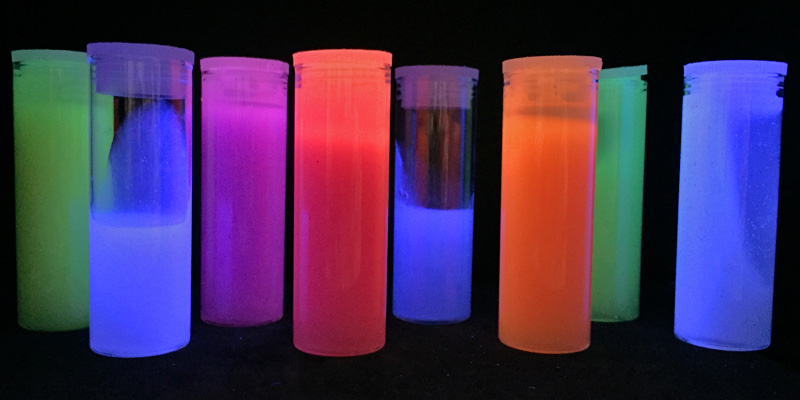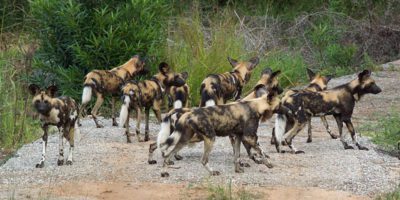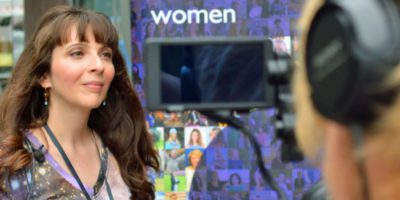Toria Stafford is a chemistry Ph.D. student at the University of Manchester. Prior to this, she studied for her master’s degree in chemistry at the University of Warwick. She is passionate about books, chocolate and science communication.
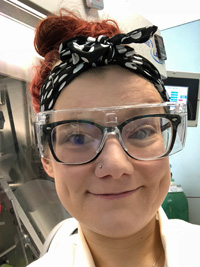
Toria is taking part in a Soapbox Science talk, which takes place on 21st July 2018, as part of the Bluedot Festival. The title of her talk is: “Dig that Uranium Glow”
Hello crystal growing kits, mini microscopes and kitchen chemistry sets
Anyone who knew me when I was young will tell you is that I was always very curious and inquisitive. One of my favourite things to do over the summer holidays was visit museums and I would often get science themed presents for birthday and Christmas (hello crystal growing kits, mini microscopes and kitchen chemistry sets!).
I was a bit of a nerd but I loved it and I have always loved science. When studying for my GCSEs, chemistry is what stood out for me, partly due to the amazing teacher I had who was so enthusiastic. The more I learnt the more I loved everything to do with it so it was the logical choice to study science and maths for A-levels and then on to do chemistry at the University of Warwick for my undergraduate degree.
Here I learnt more about the different areas of chemistry but also how it intersects with other sciences, such as biology, and for my final year research project I actually looked into potential metal-based anticancer molecules. I moved to Manchester in 2013 to study for my Ph.D., where I now look at an area of chemistry that intersects with physics, so I have done a whole range of research throughout my two degrees.
The thing that fascinates me about chemistry and one of the reasons I love working in chemistry is it is all around you everywhere you look. I think the impact that chemistry has on the wider community is incredible and it really gives you an appreciation for the intricacies of modern day life and technology.
Even when things don’t go according to plan you can still get an amazing result out of it
At the moment I am writing up my Ph.D. thesis / dissertation so my day to day life involves a lot of sitting behind a desk and writing! Usually though, a lot of what I do as a Ph.D. student involves working in a lab. One of the things I really love about research is there is no such thing as a typical day, every day is different and even when things don’t go according to plan you can still get an amazing result out of it.
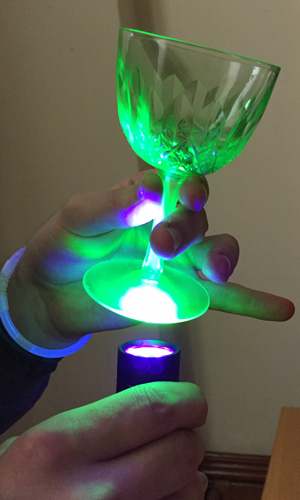
Showing people that women do science and they do it well
Manchester is a big city that has a lot of historic scientific background so there are a lot of opportunities to get involved in all kinds of outreach and public engagement. I am a passionate advocate for women in STEM (science, technology, engineering and maths) and I believe one way of achieving better gender balance in science is by making women more visible, showing people that women do science and they do it well.
Soapbox Science – as a public outreach platform for promoting women scientists and the science they do – perfectly fits this so I jumped at the chance to get involved. The first time I was involved in Soapbox Science I was not actually a speaker but I volunteered to help out and assist some of the speakers for a Manchester event and my love for the organisation grew from there. Now I have spoken at two Soapbox Science events, one in Newcastle and one in Leeds, and I shall be speaking at my third event in July at the Bluedot Festival at Jodrell Bank.
My very own “Homer Simpson” moment
My talk is based around the research I do in my Ph.D. where I look at uranium and other radioactive elements to explore and better understand some of their fundamental properties and behaviours by shining a laser at them and making them glow – my very own “Homer Simpson” moment, as I like to call it. They don’t glow because they are radioactive, they glow because of the fundamental nature of the element and this is what we aim to better understand.
Historically, these elements are often overlooked because they are radioactive so little is known about them compared to other more common metals, but we need to understand more about them as they are relevant to nuclear power. We hope that the work we do in the research group I am in can help develop a leak detection method for the storage of radioactive waste to ensure the safety of the environment and society.
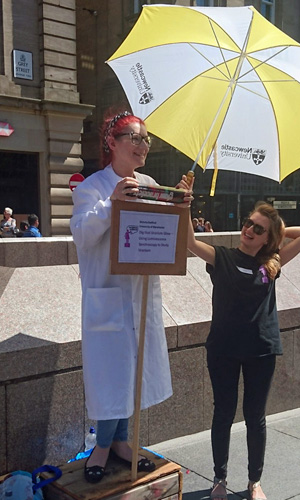
In the past I have given a similar talk for each of the Soapbox Science events where I have spoken, but with different demonstrations and examples. This time, however, I should hopefully be working with an artist to develop a visual representation or performance based on my research so that is something that I am really looking forward to exploring as I have not really done anything like that before.
I think it is important to show people that science and art are not two separate things, there is a lot of beauty in science and we should celebrate that.
Taking small steps to confront my fear
With the amount of public engagement and outreach events I do it may be hard to believe that I am actually quite a shy and nervous person. At the beginning of my Ph.D. I could barely stand up in front of the few members of my research group and my supervisor without my voice cracking and legs shaking with nerves.
Speaking in front of people, however, is really important for almost any industry you want to go into, including science where dissemination of your work at conferences is one of the ways you let people know what you are researching and what results you have. I knew that I would have to become more at ease with speaking in front of people so I took small steps to confront my fear by taking part in different events.
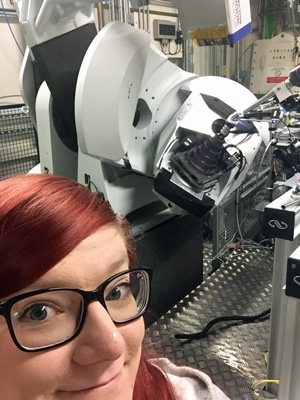
I no longer get completely flustered if a demonstration goes wrong or I forget one small thing I wanted to say and I can hold my voice and legs steady when presenting to quite large audiences. It is a very rewarding feeling to know that all my hard work paid off and now I can talk to people about really important issues in science but also everyday life.
People with outdated opinions do not reflect the values of modern society
I think diversity of thought and multiple perspectives are important, not just in science but with everything. It can be easy to overlook something if everyone has the same opinion, experience or perspective, drawing on a diverse base helps a group as a whole consider how decisions affect different audiences or users.
There are quite a few examples where a certain group have been excluded or not listened to during the design and development of something so aspects have been overlooked, e.g. skin tone being overlooked on hands-free soap dispensers or ill-fitting personal protective equipment for women as it has not been designed with their body shape in mind.
I have even heard people say they have raised how something would affect a certain group of people only to be told: “That kind of discrimination doesn’t happen anymore”, so the powers that be often don’t feel the need to consider that aspect, or discuss how to help with a certain issue (such as the underrepresentation of women in STEM). It’s not right that the people concerned with the issue are often not being asked themselves.
Initiatives like Athena SWAN help draw attention to the fact that these issues still exist, that there are still people with outdated opinions that do not reflect the values of modern society. This attention means that people are a lot more aware of how real some of these issues are and that they do still exist.
Whilst some are not perfect, we have inclusion and diversity boards, committees and targets that keep this awareness going so people do continue to at least try and accommodate different groups of people, needs or interests, and that can only be of benefit to organisations and society.
Take the leap and take a risk
Although it may be hard at times, never think you can’t do something just because you are a girl or woman. I have that mentality and attitude because growing up I was never stopped from doing something just because I was a girl. Now, as a woman, I don’t see myself as inferior and I don’t think anyone should. We are all human, we are equally as capable and equally as valuable as any boy / man.
The biggest advice I feel I can give you is immerse yourself in anything and everything you can to do with science from popular science books to YouTube. Network and get to know people – social media has become a very powerful tool and so many of the opportunities I have come across have been thanks to social media and the connections / friends I have made through it, so it is like a snowball effect.
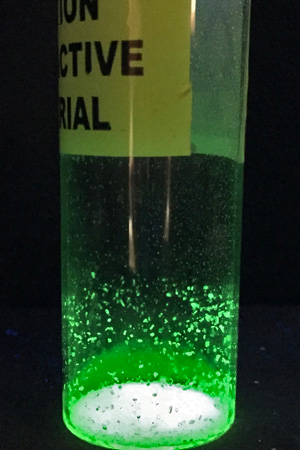
At a university open day, I approached an academic at the University of Oxford and asked for some work experience. He said “no” but he passed my name and contact details on to someone else who not only got me a week of experience, which meant I also got to meet some other students there on a pre-university summer school and get some one-on-one time in a university lab learning how it all works.
Seize the moment, as they say – it may be cheesy but it is true!
Coming up
Throughout my Ph.D. I have loved the research and the lab work but I have come to find a greater passion, and that is my science communication, public engagement and outreach work. While I currently have nothing lined up for after my Ph.D. at the moment (except maybe a holiday!) I really hope that soon I can pursue this as a full time career rather than just a hobby on the side.
Not only do I enjoy it but I also think it is really important to involve the general population in the science community, inform them about what happens behind the historically closed doors and help break the ‘old man in a white coat’ stigma many still perceive scientists as.
https://www.discoverthebluedot.com/
https://twitter.com/ToriaStafford

